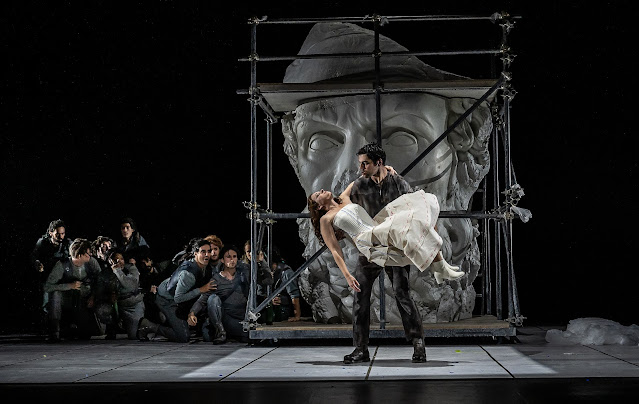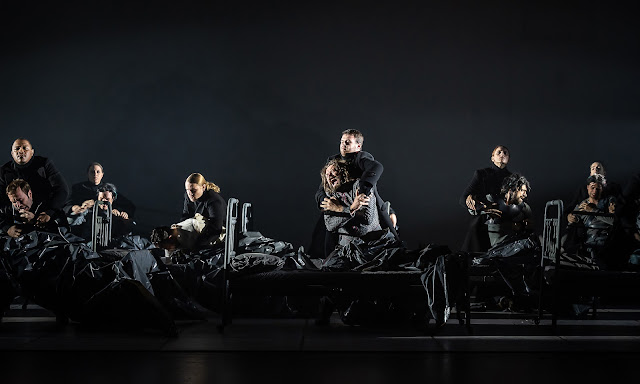 |
| Fromental Halévy: La Tempesta - Giulio Pelligra, Hila Baggio, Giorgi Manoshvili, Nikolay Zemlianskikh - Wexford Festival Opera (Photo Clive Barda/ ArenaPAL) |
Fromental Halévy: La tempesta; Nikolay Zemlianskikh, Hila Baggio, Giorgi Manoshvili, Giulio Pelligra, Jade Phoenix, director: Roberto Catalano, conductor: Francesco Cilluoffo; Wexford Festival Opera
Reviewed 3 November 2022 (★★★★)
An Italian opera, on a Shakespearean subject, by a French composer, commissioned for performance in London, results in a work with engaging musical moments and rather fractured drama
 |
| Halévy: La Tempesta - Giorgi Manoshvili Wexford Festival Opera (Photo Clive Barda/ ArenaPAL) |
Halévy's La Tempesta was our final visit to 2022 Wexford Festival Opera (3 November 2022). The work was directed by Roberto Catalano and conducted by Francesco Cilluffo, with sets by Emanuele Sinisi, costumes by Ilaria Ariemme, lighting by D.M. Wood and choreography by Luisa Baldinetti, with Nikolay Zemlianskikh as Prospero, Hila Baggio as Miranda, Giorgi Manoshvili as Calibano, Giulio Pelligra as Fernando, Jade Phoenix as Ariele, Rory Musgrave as Alonso, Richard Shaffrey as Antonio, Gianluca Moro as Stefano, Emma Jungling as Sicorace and Dan D'Souza as Trinculo.
La Tempesta was successful in its day being performed both in London (in Italian) and in Paris (in French) and the premiere featured a strong cast including Luigi Lablache (as Calibano), and Henriette Sontag (as Miranda), and the dancer Carlotta Grisi as Ariele. There are two surviving versions of the opera, one with Ariele as a dancer and one with Ariele as a singer, this latter was the one performed in Wexford.
The opera is in a prologue (covering the shipwreck) and three acts, telling a version of Shakespeare's tale. This is French grand opera, so we should not expect faithfulness to the source, but Scribe's efforts to turn Shakespeare's play into an opera have effectively neutralised the plot.
Miranda is of course the prima donna with Fernando (Ferdinand) as her primo uomo. Calibano (Caliban) is the villain, with a suitably increased role, including support from the off-stage voice of his mother Sicorace (Sycorax). Ariele (Ariel) is a coloratura soubrette, which leaves Prospero as somewhat a spare wheel. Instead of being the protagonist, he flits in and out of the drama.
 |
| Halévy: La Tempesta - Jade Phoenix, Nikolay Zemlianskikh Wexford Festival Opera (Photo Clive Barda/ ArenaPAL) |
The result is an engaging series of set pieces. Miranda, Fernando and Calibano all get large-scale entrance arias, the duet for Miranda and Fernando is rather wonderful, and what little music Prospero does get is sufficiently engaging to make you regret his reduced role in the drama. Similarly, Ariele has enjoyable interventions though he spends rather too long locked into a tree! But all this does not quite add up to a coherent drama, because there is no real protagonist; the tenor hero, Fernando, is almost entirely passive. Halévy is a composer who broke the mould in his 1838 grand opera La Juive when the starring tenor role was given to the heroine's father rather than her love interest, and you regret that something similar was not done here.
As it was, Roberto Catalano's regie-theater heavy production perhaps was not ideal and La Tempesta would have benefitted from a fluffier, more divertissement-like approach. That we were serious regie-theater territory was suggested by the metal-frame beds in the Prologue and the greatcoats worn by the chorus and dancers, all of which felt very 1980s. But set against this, Ilaria Ariemme's costumes also had an element of whimsy; Fernando, Miranda, Prospero and Ariele were all in cream, apparently wearing toiles, outlines for some unspecified and as yet unfinished costume, with both Fernando and Mirando in distinctly Tudorbethan dress.
Roberto Catalano contributed a short article to the programme book, entitled The Site of Nostalgia, which elucidated his approach to the opera, or at least tried to though I have to confess that despite re-reading, I remained none the wise.
 |
| Fromental Halévy: La Tempesta - Hila Baggio, Giorgi Manoshvili - Wexford Festival Opera (Photo Clive Barda/ ArenaPAL) |
The cast made as strong a case as can be for the piece, and all successfully negotiated the various technical and stylistic hurdles that Halévy presented them with. Hila Baggio was an engaging Miranda, fragile sounding but with an inner strength. Despite being announced as ill, Giulio Pelligra made a bravely ardent Fernando with a positively fearsome entrance aria. Jade Phoenix was an enchanting Ariele, full of charm and technical delight. Nikolay Zemlianskikh made a charismatic Prospero, almost managing to compensate for the way the role was under written. Giorgi Manoshvili was a vivid Calibano, dim but engaging.
Gianluca Moro and Dan D'Souza had great fun as Stefano and Trinculo in the lively drinking scene, whilst Rory Musgrave and Richard Shaffrey did their best with the little music allotted to them as Alonso and Antonio. Emma Jungling gave sterling support in the off-stage role of Sicorace, Calibano's mother. Francesco Cilluffo and the orchestra brought out the best of Halévy's score.
This was a brave and worthwhile enterprise. Significant editorial work had to be undertaken in order to create a modern performing edition. La Tempesta might not be a masterpiece, but it is a fascinating corner of musical history, a piece of cross-border cross-pollination that did not quite work. Yet there is plenty of engaging music in the opera, and we never learn about a work until someone has been brave enough to stage it.
 |
| Fromental Halévy: La Tempesta - the Prologue - Wexford Festival Opera (Photo Clive Barda/ ArenaPAL) |
Never miss out on future posts by following us
The blog is free, but I'd be delighted if you were to show your appreciation by buying me a coffee.
Elsewhere on this blog
- Musical and dramatic riches: Wexford revives Dvorak's final opera, Armida, in an imaginative production with some superb singing - opera review
- Intriguing work in progress: Alberto Caruso & Colm Toibin's The Master in its first full staging at Wexford - opera review
- Beyond Orientalism: Orpha Phelan's imaginative new production of Félicien David's Lalla-Roukh at Wexford - opera review
- Barbara Hannigan conducts Stravinsky & Knussen as part of a collaborative project between the Royal Academy of Music and the Juilliard School - concert review
- The Crown: American counter-tenor Randall Scotting his disc of arias written for the castrato Senesino and the research that went into creating it - interview
- Reflections on All the Ends of the World: violinist Lizzie Ball on her project with The Sixteen to highlight climate change and global warming - feature
- In search of eternal life: creating my cantata Et expecto resurrectionem, cryogenics, Burke & Hare, Frankenstein and more - feature
- Julian Phillips new piece alongside Britten and Schubert in a wonderfully imaginative programme for tenor, horn and piano at Oxford Lieder Festival - concert review
- Richly serious: mezzo-soprano Yajie Zhang and pianist Hartmut Höll in Brahms and Mahler in Oxford - concert review
- Orpheus at Opera North: greater than the sum of its parts - opera review
- Six musicians & four jugglers: introducing United Strings of Europe's Apollo Resurrected - feature
- Sarojini: Shruthi Rajasekar's new piece, premiered by Hertfordshire Chorus, merges Western classical and Carnatic musical traditions - concert review
- Home











No comments:
Post a Comment